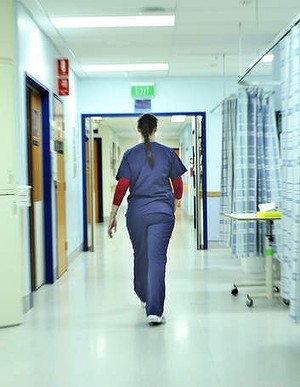
Billions of dollars will be slashed from already-strained public hospital budgets under plans that could lead to huge increases in waiting times for surgery and emergency treatment.
Patients could be charged for treatment in public hospital emergency departments as well as facing new fees to visit their GP, get a blood test or an X-ray under radical changes the government says will put the brakes on unsustainable spending growth.
The historic changes effectively tear up funding agreements with the states and topple two of the pillars of Australia’s system of universal healthcare – bulk-billed treatment under Medicare, and free care in public hospitals – and will be bitterly opposed by Labor and health groups.
Despite promising before the election not to cut money for health, the Coalition will dramatically shrink the Commonwealth’s share of hospital funding, cutting its annual contribution by $15billion by 2024, with the deepest cuts beginning in 2017.
In the meantime it will cut more than$200 million in reward payments for hospitals meeting federally-imposed performance targets for surgery and emergency treatment.
The funding has been used to reduce what is known as ”bed block”, essentially a shortage of resources blocking hospitals from moving people from emergency to a bed, or performing non-emergency surgeries.
The Commonwealth will for the first time allow the states to charge patients for public hospital treatment, partly to deter people from circumventing a $7 fee for GP visits by going to the emergency department, despite strong opposition from doctors who say hospitals are not placed to deal with the administrative burden.
The previously-mooted $7 fee will apply to GP visits, diagnostic imaging such as X-rays and pathology services such as blood tests. Concessional patients and children under 16 years will pay the fee only for the first 10 services they use each calendar year. The government will cut its contribution to the cost of those services by the same amount, saving it $3.5 billion over five years. Part of the new fee will go towards a new $20 billion medical research fund.
Patients will also pay more for prescription medications, with the general patient contribution rising next year by $5, while the contribution by concessional patients will rise by 80¢.
Consumers Health Forum chief executive Adam Stankevicius said the budget spelled the end of universal access to primary care under Medicare.
“This is a retrograde health budget that will shock Australians who thought this government was the best friend Medicare ever had,” Mr Stankevicius said.
“This health budget offers the distant prospect of a $20 billion medical research future fund but fails to recognise the extraordinary out of pocket costs consumers already face to access essential health care.”
Income thresholds for the Medicare levy surcharge and the private health insurance rebate will be frozen for three years. The changes will affect 175,000 individuals and 134,000 families who will either pay more tax if they do not purchase private hospital cover, or will receive a lower level of rebate or lose their eligibility completely.
In changes that will increase out-of-pocket costs for many patients, safety-net arrangements for Medicare and the Pharmaceutical Benefits Scheme will be made less generous. Patients will have to spend more on prescriptions to qualify for cost relief on their medications.
The spending threshold for relief under the Medicare safety net will be lowered, but the benefits payable will be capped, a change that is expected to produce more than $260 million in savings.
Programs designed to prevent disease have also been targeted. Terminating a partnership agreement with the states on preventive health will save $368 million, while $3 million will be cut from anti-smoking campaigns, and the National Preventive Health Agency will be abolished.
Agencies responsible for health workforce planning and GP training will also be abolished, while six other agencies will be merged into a new health productivity and performance commission.
The 61 Medicare Locals set up by the Gillard government to plan and co-ordinate health services will be replaced by a smaller number of bodies, to be called Primary Health Networks, which will perform a similar function. They will be aligned with state-run local hospital networks, and have clinical councils largely made up of local GPs.
Australian Healthcare and Hospitals Association chief executive Alison Verhoeven welcomed the rationalisation of health agencies, which she said would reduce duplication and administrative costs.
“The proliferation of agencies that has occurred recently has done little to improve health services in Australia,” she said.
But she criticised the introduction of a $7 fee for Medicare services such as visits to doctors.
“This is really a cost-shifting exercise, with the states and consumers to bear the greater burden of the health budget.”
“It’s very bad news for consumers, particularly the elderly and those with chronic disease.”
The president of the Australasian College for Emergency Medicine, Anthony Cross, said the introduction of the fee would lead to more people seeking treatment in emergency departments for problems more appropriately treated by GPs, and it would be ”almost impossible” for hospitals to decide which patients should be charged for treatment.
“The burden faced by hospitals trying to administer such a scheme would be significant and would negate any potential cost-savings envisioned by governments,” Dr Cross said.
Source: Sydney Morning Herald
